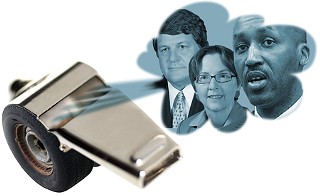Former Fleet Services Manager Says Scrap Tires Only a Symptom
Fired whistle-blower says management has ignored serious problems for years
By Jordan Smith, Fri., Aug. 6, 2010
Officials in the city's Fleet Services department were reportedly warned about problems in the city's tire management program as early as seven years ago.
That's what a former Fleet manager turned whistle-blower told the Chronicle – a version of events that again conflicts with city officials' evolving story about what they knew and when they knew that tires, especially those destined for the scrap heap, were not being properly tracked or disposed of in order to account for inventory and comply with state law.
Hiram Kirkland, who had previously declined to discuss the matter due to his pending litigation against the city, broke his silence last week. According to Kirkland, a former Fleet operations manager who was terminated in March 2009 (allegedly for a conflict of interest), he began reporting inconsistencies in the tire program as early as 2003 and then in earnest starting in 2006, when he says he was told by his supervisors that the city did not have to follow state law pertaining to the disposal of used rubber. There were "no controls, and no one watching, and they're leaving a lot of money on the table," Kirkland said.
In December, the Chronicle reported that thousands of city vehicle tires had been abandoned on a tract of land leased by Victor Almaguer, owner of Vic's Tire Service, which once had a contract with the city to fix flats. Almaguer was not contracted to transport, store, or dispose of used city tires, nor was he registered with the state (as required) to do so. Nonetheless, Almaguer said he'd been collecting the city's worn-out rubber since 2003 at the direction of then-Tire Program Manager Bill Janousek. (Janousek was terminated earlier this year for failing to adhere to city personnel policies; he is in the process of trying to get his job back.) Through a review of Fleet records, we found that since at least 2006 (the first year for which we requested records) the city had failed to complete a single tire manifest form correctly – meaning not only was the city not in compliance with state environmental laws, but also that there was no way for the city to determine how many tires it had disposed of or where those tires landed.
City officials first told us that they'd only learned of the piles of city-owned scrap tires in Southeast Austin when the Chronicle began making inquiries last fall. After we provided extensive documentation obtained from a Fleet service center manager, Daniel Lomas, reflecting that he told Fleet managers about the tires beginning in May 2008 – and that City Manager Marc Ott had been alerted to the problem by Lomas last summer – the city changed its explanation. Yes, Ott had received that e-mail, we were told during a July meeting at City Hall, but he passed it on to then-City Attorney David Smith, who apparently told no one else about it – not at Fleet and not at the city's financial services division, which includes Chief Financial Officer Leslie Browder, who ultimately oversees Fleet's operations. Instead, Smith reportedly turned the information over to Austin Police and that was it. Fleet officials acknowledged that in October 2008 they began a review of tire-related processes and then, beginning in September 2009, began asking questions of the Texas Commission on Environmental Quality about whether the city's manifest process complied with state law. But it wasn't until after we reported on the abandoned tires that the city actually began following state law, contracting with a specific vendor to dispose of the tires properly.
Follow the Tires
But according to Kirkland, he alerted former Fleet Officer Tom Wieczorek about possible problems with the tire program in 2003 – shortly after he started his job as a manager over two Fleet service centers that handle solid waste vehicles. Kirkland said that one of his shops was next door to the tire shop and that on more than one occasion while working late he saw Almaguer pull a trailer up to the tire shop and remove tires from the city's scrap stack. On occasion, he said, it seemed that Almaguer was taking "a lot" of tires that still had "useful life left on them." (Notably, when we first inspected the scrap-tire pile at Vic's Tire Service, there was at least one city-owned tire marked as dating from 2003.) Almaguer said that he was never told he could take tires that were still useful, but he said it was common that the city would throw out tires that it could no longer use but that still had some life left. "There are quite a bit of tires that they throw away that a person could fix up and sell," he said. But at that point, the city would have abandoned its legal responsibility to track the tires to disposal.
According to Kirkland, Wieczorek said he would look into it. Kirkland doesn't believe that ever happened, because after Kirkland was promoted to operations manager in 2006, he realized there were still improprieties occurring with city tires – including that tires were not being tracked with proper manifest paperwork. Again, Kirkland said he took his concerns to Wieczorek and Janousek, who was still running the tire program. "I was concerned about proper tire disposal," Kirkland said during an interview last week, his first since filing a whistle-blower lawsuit against the city in 2008. But he says that he "kept getting shut down" by Wieczorek and then Janousek, both of whom repeatedly told him that the "city was exempted from the manifest process." Moreover, Kirkland says, he was told that as long as the city had a contract with a tire supplier, the "vendor guaranteed proper disposal" – in other words, that the city bore no responsibility for tracking the tires to their final disposition.
As it happens, that is a misstatement of state law, yet one that has apparently been repeated by Fleet officials in the years since. In an audio recording of an August 2009 meeting between Service Center Manager Lomas and the current Fleet administrator, Gerry Calk, the head of Fleet tells Lomas that the city is not liable for its used tires once they're taken from the city for disposal.
Since then, Fleet (and city management) officials have acknowledged that their previous understanding of state regulations was incorrect, but Kirkland's account suggests that the official blind eye had been turned on the problem for far longer than city officials have so far acknowledged.
Wieczorek, who is now retired and living out of state, said he does remember an allegation that good tires were being dumped as scrap and sold by local used tire vendors – an allegation he said could have come from Kirkland back in 2003. As Wieczorek recalls it, Austin Police were contacted about the matter, and "they followed up but couldn't do anything" to prove any local businesses were actually selling old city tires.
But Wieczorek denies telling Kirkland that the city was exempt from environmental regulations regarding scrap tires. "I never said the city was exempt from that because I knew it wasn't," he said.
More generally, city spokesman Reyne Telles responded, "The allegations made span a seven-year period and primarily involve former employees. It is not realistic to suppose that current staff could provide comment, under deadline, on alleged instances involving a timeframe that precedes their own employment," although he added that the city will continue to work with the Chronicle "in order to answer questions as best we can."
Telles also said that "specifics concerning Hiram Kirkland involve active litigation and thus the city is limited in the scope of comment that can be made."
(The city fought successfully last fall to have Kirkland's whistle-blower lawsuit dismissed, but Kirkland has appealed, and the case is currently pending before the 3rd Court of Appeals.)
Kirkland said it wasn't the first time he'd documented serious problems with Fleet operations nor the first time that those concerns went unheeded. Indeed, he said that when he was promoted to Fleet operations manager in 2006, Wieczorek gave him a specific task: Find out why Fleet was carrying a $2.5 million budget deficit, and fix the problem. Kirkland had reduced waste at his service centers and took on the new task with similar focus.
Inventory Mystery
Kirkland quickly found problems not only with the tire program but also with the inventory controls at Service Center 13, which services Austin Police Department and Austin Energy vehicles. According to Kirkland, in reviewing inventory at the center, he noticed that a manager had accessed back records, reopened old work orders, and charged to those documents additional parts inventory – including batteries and Freon. That might make sense if someone had forgotten to list a part on a particular invoice, but according to Kirkland the revisions were chronic and inexplicable. For example, "There's no way you can put three batteries in one Crown Vic" police car, he noted.
Kirkland assigned Lomas (now manager of Service Center 5) to help him review the inventory documents. In all, they found 250 work orders that had been changed after they were officially closed, and 150 instances in which they felt the changes were not easily explained – for example, the three batteries in a single cop car or another instance in which 30 pounds of Freon was billed to a Ford F-150 truck, a vehicle that "takes about 3 pounds" of the air conditioner gas, he said. Kirkland brought those examples to Wieczorek, who asked Fleet's human resources representative, Sharon Huckabee, to review the situation. Kirkland and Lomas turned over documents to Huckabee, Kirkland said. But nothing happened.
A "long time had passed, and I could not get ... Huckabee to return my phone calls," Kirkland said. Ultimately, he said, she did contact him but said she really needed the information in a different format; Kirkland did as asked and heard nothing more. It is unclear what happened after he provided the reformatted information in early 2008. Not two months later, he was removed from his position and placed on a lengthy administrative leave. He never returned to work.
Asked about this history, spokesman Telles responded in an e-mail, "Sharon Huckabee has it documented that the first time Hiram conveyed a concern was ... in October 2007. Further, more specific and meaningful documentation was provided to her in February and March 2008, at which point the investigation moved forward through the City Auditor." In a telephone conversation, Telles added that Huckabee says she was waiting for "further definition of what the allegations were."
In March 2008, Kirkland said, he got an unexpected visit from the city auditor's integrity unit. Ultimately, he learned that the auditor's office was there to investigate a 6-month-old anonymous phone tip; the caller had alleged that Kirkland was improperly steering service centers' manufacturer warranty work done on city-owned vehicles to Riata Ford – where his son was employed. Kirkland vehemently denies the allegation. City policy dictated that when service was needed on a warranty vehicle, the work would be spread among the local dealerships – in the case of Ford vehicles, Kirkland said, that meant the work would be split among Truck City, Maxwell, and Riata Ford. "I had the numbers run, and [the work the city sent out] was almost equal" among the three dealers, he said recently. Kirkland said he had clearly disclosed to Wieczorek that his son worked at Riata and that he'd been told by city officials that it wasn't a problem.
But in a report issued by the assistant city auditor in September 2008, Susan Wynne, head of fraud investigations for the office, reported to CFO Browder that Kirkland had not disclosed his son's relationship to Riata, which was a conflict of interest, and "several" service center employees reportedly told Wynne that they felt that Kirkland had pressured them into using Riata. Ultimately the APD, which also investigated, closed out its inquiry without recommending criminal charges. Early last year, Kirkland was officially terminated. He filed suit, alleging that he was retaliated against for bringing to light numerous problems – including in the tire program and at SC 13 – that were never fully investigated. "I realized there was a movement to get me out of there," he said recently. "I was trying to fight on too many fronts."
On March 30, 2009, well over a year after Kirkland reported the problems, Wynne reported to new Fleet Officer Calk that an investigation of an allegation of "a large-scale theft of inventory" at SC 13 was found to be without merit. The problem, she noted, was simply that employees at the center were "using an alternate form of inventory adjustment compared with other service centers."
However, Wynne also noted that her investigation, undertaken based on "information from an employee," was not comprehensive but designed only to determine "the veracity of this allegation." Therefore she could not say whether employees might actually be stealing; the auditor's office "cannot provide assurance that employees have not stolen inventory from the service center using other concealment methods," she wrote. Both Kirkland and Lomas dispute Wynne's findings – using an alternate inventory recording method does not explain the irregularities they found in the SC 13 records, they say. And neither man knows if the problems with record-keeping are ongoing; Lomas said he was subsequently told by Calk to concentrate on managing his own center.
Ultimately, Kirkland says he believes the problems at Fleet go much deeper than a pile of scrap rubber, and a large part of the problem is the apparent city management acceptance that things at Fleet – responsible for the more than 5,000 vehicles owned by the city – will never change. "The root of the problem ... is that the rule of thumb is that you don't rock the boat. It is just common knowledge that human resources, the assistant city managers, the city manager, don't want these things reported. So you've got 90 percent of the guys working hard every day and they close their eyes to all of this," he said recently. "It's the way the whole system is designed: Report nothing and get along just fine."
Got something to say on the subject? Send a letter to the editor.











